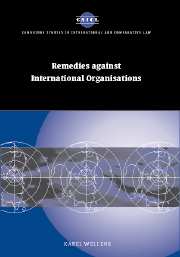Book contents
- Frontmatter
- Contents
- Acknowledgements
- List of abbreviations
- Introduction
- Part I General features of remedies against international organisations
- 1 The accountability regime for international organisations
- 2 Remedies against international organisations
- 3 The different levels of accountability and the appropriateness of various remedies: scope ratione materiae
- 4 Access to remedies
- 5 Remedies against whom: the scope ratione personae respondentis
- 6 The potential outcome of remedies: scope ratione remedii
- Part II Procedural aspects of remedial action against international organisations
- Part III Substantive outcome of remedial action against international organisations
- Part IV Alternative remedial action against international organisations and options for the future
- Conclusion
- Bibliography
- Index
- CAMBRIDGE STUDIES IN INTERNATIONAL AND COMPARATIVE LAW
6 - The potential outcome of remedies: scope ratione remedii
Published online by Cambridge University Press: 13 July 2009
- Frontmatter
- Contents
- Acknowledgements
- List of abbreviations
- Introduction
- Part I General features of remedies against international organisations
- 1 The accountability regime for international organisations
- 2 Remedies against international organisations
- 3 The different levels of accountability and the appropriateness of various remedies: scope ratione materiae
- 4 Access to remedies
- 5 Remedies against whom: the scope ratione personae respondentis
- 6 The potential outcome of remedies: scope ratione remedii
- Part II Procedural aspects of remedial action against international organisations
- Part III Substantive outcome of remedial action against international organisations
- Part IV Alternative remedial action against international organisations and options for the future
- Conclusion
- Bibliography
- Index
- CAMBRIDGE STUDIES IN INTERNATIONAL AND COMPARATIVE LAW
Summary
With regard to the potential outcome of remedies, there generally seems to be an obvious connection between the identity of the party seeking redress, the kind of accountability involved, and the forum before which a remedial action has been brought. Although remedies available to states within the internal system of an international organisation are not designed to afford redress to the individual, they may produce indirect remedial effect to groups of individuals potentially affected by the organisation's act or omissions.
Judicial remedies
The potential outcome of non-judicial legal remedies will be analysed shortly, but with regard to judicial remedies the following aspects are of particular relevance, both to proceedings before the International Court of Justice and before arbitral tribunals.
Express guidance on declaratory judgments, specific performance or injunctive relief cannot be found in Article 36 of the Statute of the ICJ, which in the remedial sphere has applied general principles of procedural law.
The remedial function of declaratory judgments has perhaps too often been underestimated and regarded as a separate category. Ian Brownlie has identified, inter alia, the following ‘remedial forms sheltering under the umbrella of the declaratory judgment’: the finding of liability could provide an impetus for negotiations as an appropriate solution to the dispute; the ruling as a matter of principle that certain conduct is not in conformity with international law; that specific performance is required as the consequence of the decision on entitlement.
- Type
- Chapter
- Information
- Remedies against International Organisations , pp. 54 - 60Publisher: Cambridge University PressPrint publication year: 2002

